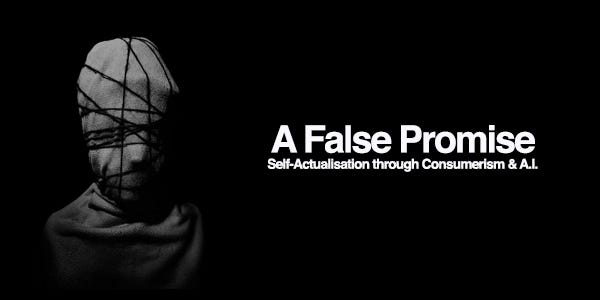Morning Comrades.
Monday’s subject, the case against the usage of artificial image creation and other services such as ChatGTP continues today. Despite many of the current political and social events taking place there is a deep need to continue this conversation and today’s dispatch aims to tackle a conversation about ownership, consumerism and self-actualisation within the context of the current reality pushed on us, involuntarily, by the realities of these LLM’s and Image Thieving Services. This entire train of thought and the exploration was based on the false argument that the above services “create” and that its users are creators, falsifying the realities of creation, ownership with consumerism and how that in turn has become an entire personality, something worth of nothing but utterly destructive rejection. That’s what we are here for today.
First off though, a few words on the concept of self-actualisation and what it means. Self-actualisation, broadly defined in psychology, refers to the realisation of one’s full potential. In Abraham Maslow’s hierarchy of needs, it is the highest level of human development, involving creativity, problem-solving, and personal growth. Additionally, within a Marxist framework, self-actualisation takes on a more materialist and social dimension, where individual fulfillment cannot be separated from economic conditions, labour relations, and collective human development.
Human Flourishing Beyond Alienation
For Marx, genuine self-actualisation is the ability to freely and creatively engage in fulfilling work and social relationships, unimpeded by alienation, exploitation, and market forces. In The German Ideology (1845), Marx and Engels argue:
"In communist society, where nobody has one exclusive sphere of activity but each can become accomplished in any branch he wishes, society regulates general production and thus makes it possible for me to do one thing today and another tomorrow... to hunt in the morning, fish in the afternoon, rear cattle in the evening, criticize after dinner, just as I have a mind, without ever becoming hunter, fisherman, shepherd, or critic."
Here, self-actualisation is not about accumulating material goods but about having the freedom to engage in diverse, meaningful, and creative activities. Under capitalism, people are reduced to their job roles, locked into rigid labour markets that define them as mere workers, rather than fully realised individuals.
Alienation as a Barrier to Self-Actualisation
Karl Marx's theory of alienation elucidates how capitalism estranges individuals from their labour, the products they create, and ultimately, from themselves. This alienation is exacerbated by the capitalist emphasis on ownership as a means to personal fulfillment. As noted in the Encyclopedia of Marxism, "Marx believed that under capitalism we are 'alienated' or 'separated' from our potential to creatively plan and control our collective fate."
Thus, capitalism restricts self-actualisation by making economic survival contingent on wage labor while promoting the illusion that ownership equates to fulfillment.
The False Self-Actualisation of Consumerism
In contemporary capitalism, self-actualisation is distorted into consumer identity, where personal growth is measured by what one owns rather than by creative or intellectual development. As Mark Fisher writes in Capitalist Realism:
“It is easier to imagine the end of the world than the end of capitalism.”
This captures the pervasive ideology that fulfillment is only possible within the capitalist framework, reinforcing the idea that material accumulation leads to happiness. In reality, consumerism only deepens alienation, offering temporary satisfaction through commodities while leaving the fundamental human need for autonomy, creativity, and community unfulfilled.
Let’s get into it.
Keep reading with a 7-day free trial
Subscribe to Black Lodges to keep reading this post and get 7 days of free access to the full post archives.


